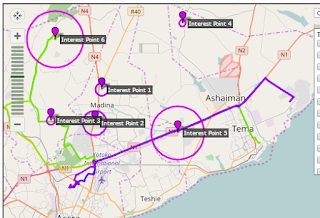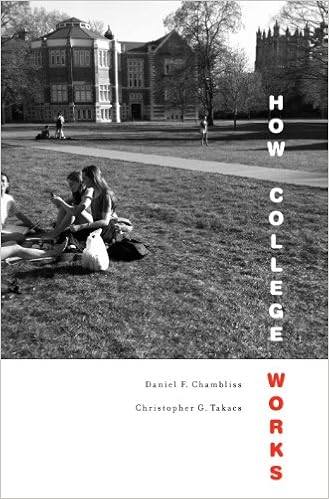Charlie writes:
Following are my observations after reading the book
"How College Works"
by Daniel F. Chambliss and Christopher G. Takacs, 2014,
selected for the Ashesi Faculty/Staff retreat, June, 2016
Interesting quote: "More like a church or even a family,
a college serves multiple interests which are constantly
shifting." I had not expected academics to admit of
this reality, but the book exhibits a student-centered
tone throughout.
As I read the chapter on entering and making friends,
I considered the FDE class our freshmen experienced
as an academic activity similar to sports or choirs
that demanded lots of time and could have resulted in
close friendships for the members of the class of 2019.
I wonder if other faculty/staff have heard this from
the class.
Sociological factors important for making friends:
Physical proximity, Meeting early in college career,
Time together with a large, yet knowable number of
fellow students, Some exclusivity, and Shared interests.
This helps me understand Patrick's emphasis on constructing adequate
on-campus living spaces.
Students without friends are more likely to transfer,
drop out, or not be able to study well. Have one
2019 student in mind that I'm concerned about.
Faculty that students choose as mentors have these
characteristics: exciting, skilled and knowledgeable,
accessible (easy to find, available, approachable),
and engaging. Worthwhile objectives, hard to measure.
Vital importance of freshmen instructors: engaging
the students into the academy, legitimating the
disciplines. The first year is a special opportunity.
When professors don't have students in a series of
classes, mentorships don't develop.
Dinner at a professor's home is magical, a talisman.
The authors make an interesting argument on the
"arithmetic of engagement." Given that there are only
a few teachers that regularly engage students, you
really should put as many students in front of those,
rather than concentrate on arranging small class sizes.
Also interesting that quoting class sizes based on
the "class-weighted" average class size results in
a much smaller-sounding typical class size than a
"student-weighted" average class size. This can be
a significant effect when there are many small upper
level classes, which is not so much the case at Ashesi.
"Belonging" as a goal. I would say from what I have seen
that Ashesi students in general seem to form a strong
connection to the mission of the school by the time they
leave. As in other venues, four factors are important:
co-presence (physical interaction), shared focus of
attention, ritualized common activities, exclusivity.
The typical progression of connection begins with a
few close friends from the dorm, then a sport or club,
then a wider institutional set of "weak" linkages
mediated through parties or friends of friends. Would
have to validate that in the Ashesi context through
student interviews, not sure.
Improving the writing skills is dramatic over first two
years, but mostly comes from recognizing you have a
caring audience for your writing. The importance of
a one-on-one conference between a faculty member and
the student is also magical. This brought back memories
of the extravagant efforts Marian Horowitz made while
here, that I still hear students mention.
Improvements in public speaking. I would contend that
Ashesi concentrates a lot of attention on this, and
generates students that compete well on an international
stage.
The science versus humanities divide at Hamilton echoes
comments I hear from Ashesi students at Akorno as they
compare CS and Management tracks. I have to wonder how
the introduction of engineering will impact on this.
Students need to care about relationships, and this is
the strength of peer pressure, "making the grade" or
"joining the group." I also see an increased willingness
to challenge each other's arguments as students spend
time at Ashesi.
Skills, confidence, and relationships are the three most
salient benefits of attending college, according to the
authors of the book. A nice summary of the value of a
liberal arts education:
"The greater potential benefits of college may lie not
just in learning discrete skills, but in acquiring the
habits and attitudes that support learning and make it
intrinsically enjoyable."
I was shocked to read authors' contention that "satisfaction"
of alumni is really the "whole point" of the college
experience. I take the "transformation of the continent"
as the crux of the Ashesi vision, although the short
term measureable outcomes that I see Ashesi watching
include the ethical outlook of its graduates, their
employ-ability, and the research output of their faculty.
Curious advice to exec for how to improve alumni
satisfaction: "helping the right people find each other
at the right time." As my father-in-law said,
"you could say that is how to run any organization..."
Takeaway advice for me: learn and use your students'
names, a little personal contact goes a long way.
Takeaway advice for my students: spend your time with
good people. You must find a few good friends and a
couple of great teachers. Steps:
1. start meeting people right away.
2. choose teachers over topics.
3. pick your places for maximum interaction.
4. join high-contact activities.
5. keep your options open, socially and academically.
Ashesi could evaluate our success via phone interviews with students
who entered ten years prior. This is a difficult,
but potentially interesting approach.
The authors' closing shots on the relative unimportance
of facilities, as opposed to people, at Socrates Academy
seemed too facile.
I'm sorry I won't be present for the conversations at the retreat!











